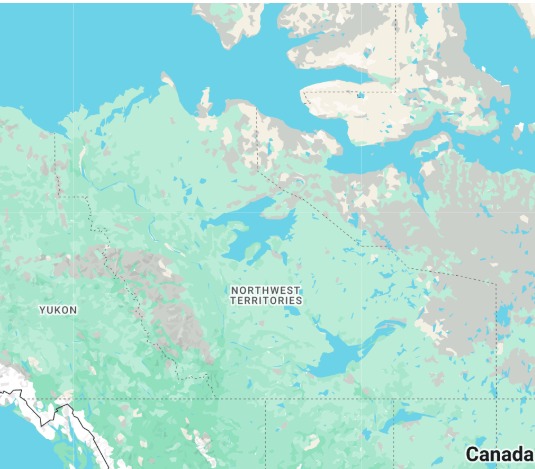The Northwest Territories (NWT) is a land of rugged beauty, spanning 1.3 million sqkm with a population of just over 45,000. Yellowknife, the capital city, houses approximately half of the territory’s residents and serves as a hub for government, mining, and commerce. Other prominent communities include Hay River, Inuvik, and Fort Smith, each offering unique opportunities for work and lifestyle. The region’s economy is driven by resource-based industries like mining, oil and gas extraction, and renewable energy, alongside growing sectors in tourism and Indigenous-led enterprises. Residents enjoy a mix of Arctic culture and a lifestyle deeply connected to the land, with outdoor activities like fishing, hiking, and snowmobiling forming a significant part of daily life

Real Estate
The real estate market in the NWT is small but vital, reflecting the unique demands of its urban and rural populations. In Yellowknife, a majority of properties cater to professionals working in government and resource extraction industries. Single-family homes dominate, followed by townhouses and apartments designed to accommodate a transient workforce. Outside urban centers, the focus shifts to rural properties suited for self-sufficient living, including cabins and homes with off-grid features.
Most Popular Types of Property
Single-family homes remain the most sought-after property type in the NWT, particularly in Yellowknife, where families and professionals prioritize space and convenience. Townhouses are also popular, offering a balance between affordability and access to urban amenities. Apartments serve the transient population employed in mining and government positions. In rural areas, demand centers around off-grid properties and cabins, ideal for buyers seeking privacy, outdoor access, and a sustainable lifestyle. These properties often come equipped with renewable energy sources, water collection systems, and year-round utility support.
Real Estate Trends
Real estate trends in the Northwest Territories reveal a stable yet competitive market. As of late 2023, residential properties in Yellowknife experienced a strong demand, with average home prices hovering around CAD 500,000. This is driven in part by limited inventory, a common issue in remote regions. Affordability concerns persist for first-time buyers, though government programs and Indigenous housing initiatives provide some relief. In rural areas, prices vary significantly based on location, access to utilities, and property size. However, these properties often cater to niche markets, including adventure seekers and those prioritizing sustainable living. The average home price in Northwest Territories as of late 2024 were around CAD 540,000 which is a 25.7% increase year-over-year from CAD 429,729.
Rural and Urban Areas
The contrast between urban and rural real estate in the NWT is stark. Yellowknife and other urban centers offer modern amenities, infrastructure, and proximity to services like schools and healthcare. These areas attract families and professionals who value convenience and community. Conversely, rural areas appeal to individuals and families seeking seclusion and a connection to nature. Properties in these regions often come with larger land parcels, minimal municipal services, and proximity to natural attractions like the Mackenzie River or Nahanni National Park Reserve. The rural market is particularly appealing to those looking to escape city life or pursue outdoor-oriented lifestyles.
Financial Considerations
Mortgage options in the Northwest Territories align with national standards, offering fixed-rate, variable-rate, and hybrid products. Interest rates are shaped by the Bank of Canada and have experienced fluctuations in recent years. As of 2024, rates remain relatively high compared to the pre-pandemic period, but signs of stabilization have emerged. Housing affordability varies significantly, with Yellowknife properties commanding higher prices and requiring substantial down payments. Buyers in rural areas may find more budget-friendly options, though additional costs for utility installation and property maintenance can add up. Incentives for first-time buyers, such as reduced interest rates or grants, are available to ease the financial burden.
Property Registration and Taxes
Property transactions in the NWT involve registration with the Territorial Land Titles Office. Buyers must cover fees for title searches, registration, and legal processes. Unlike many Canadian provinces, the NWT does not impose property transfer taxes, making it more affordable for new homeowners. Property taxes vary by municipality and are based on the assessed value of the property. Yellowknife, for instance, has a higher tax rate compared to smaller communities like Hay River or Fort Smith, as taxes fund essential services such as road maintenance, waste management, and public infrastructure.
Zoning and Land Use
Zoning and land use in the Northwest Territories are regulated by a combination of municipal bylaws and territorial planning frameworks. Zoning categories include residential, commercial, industrial, and agricultural land use, with specific provisions for mixed-use development in rural areas. The unique environmental landscape of the NWT also plays a critical role in land-use planning, ensuring sustainable development that respects Indigenous land rights and ecological preservation. Subdivision approvals and rezoning applications often involve both municipal and territorial authorities, emphasizing community engagement and long-term growth.
Popular Cities

